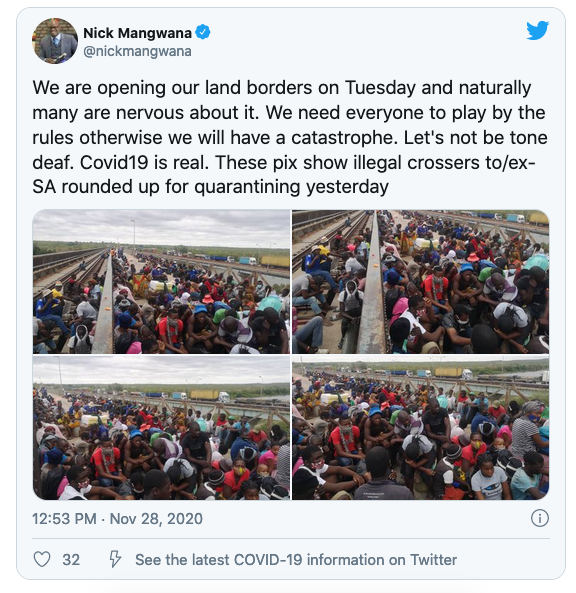
Credit @nickmangwana
Scores and scores of Zimbabwe cross border traders were rounded up by authorities on Friday at the Zimbabwe/South Africa border.
According to Zimbabwe government spokesman Nick Mangwana who shared the pictures on social media, the individuals caught were then gathered for processing for Covid-19 quarantine.
He wrote…
We are opening our land borders on Tuesday and naturally many are nervous about it. We need everyone to play by the rules otherwise we will have a catastrophe. Let’s not be tone deaf. Covid19 is real. These pix show illegal crossers to/ex-SA rounded up for quarantining yesterday.

Mangwana further added in another tweet that the individuals arrested typically cross the border into South Africa on a day’s visit for shopping before returning to the Zimbabwean side laden with goods and merchandise. Many hold no travel documents such as passports. Illegal crossing is an everyday occurrence.
Zimbabwe is preparing to officially open its border with South Africa on the 01st of December 2020 following months of closure to public travelers due to Covid-19. This same border – the Beitbridge Border Post – is the biggest and busiest border Zimbabwe shares with a neighboring country.
According to the Zimbabwe government, borders will be opened in a phased manner beginning with private passenger vehicles and pedestrian traffic and then followed by public transport vehicles after Christmas.
The many people shown in these images appear to have been intercepted and detained right on top of the Beitbridge bridge which is used by pedestrians, vehicles and trains to cross the crocodile laden Limpopo River into South Africa.
Cross border trading has steadily increased between Zimbabwe and South Africa over the years as many more Zimbabweans cross into South Africa to bring back merchandise for resale. This is due to difficult economic conditions for many ordinary people in the country.
Cross border trading is not illegal in Zimbabwe. However, the Zimbabwe government has expressed concern over the years on account of massive loss of revenue and general loss of regulation associated with this form of cross border trading.